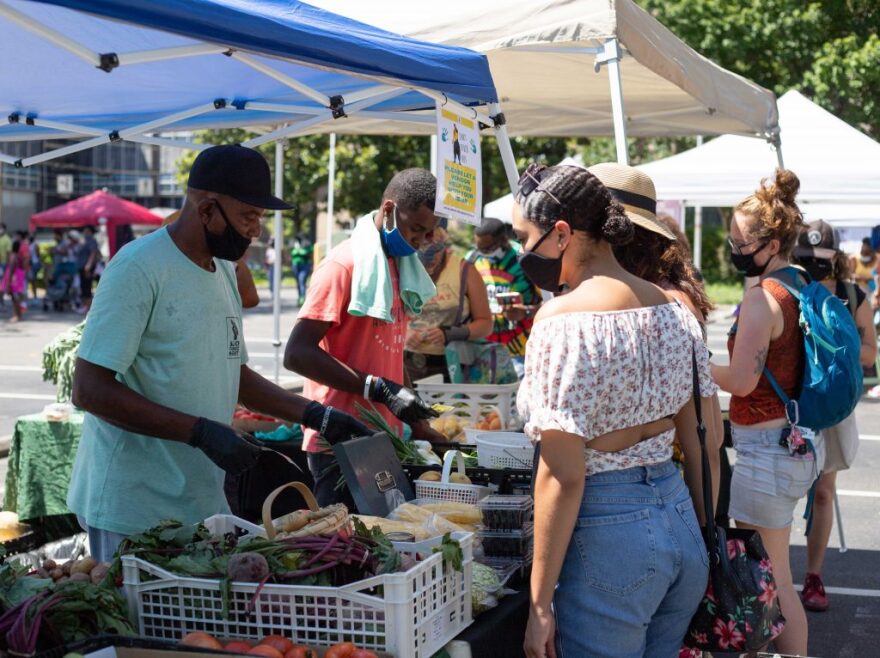For over a century, Black farmers have faced challenges in securing federal and local funding to aid their farms in times of need and during crises. COVID-19 has been no different. From lack of access to information about coronavirus relief provisions for farmers to difficulty finding spaces to safely vend during the crisis, the pandemic has made obstacles even more stark. Some farmers and organizers are finding creative ways to address Black farmers’ needs, including creating and selling community-supported agriculture (CSA) boxes and continuing to offer space at the Triangle-based Black Farmers’ Market for produce vendors to safely sell their crops.
Host Anita Rao talks to Melody Hunter-Pillion, a North Carolina State University public history doctoral student; Kendrick Ransome, a fourth-generation farmer at Golden Organic Farm in Pinetops, North Carolina; Samantha “Foxx” Winship, owner of Mother’s Finest Urban Farms in Winston-Salem; and Crystal Taylor, co-founder of the Black Farmers’ Market in Durham and Raleigh.
Four Ways That Black Farmers Make Do When The Odds Seem Insurmountable
1. They Lean Into Hope
Kendrick Ransome grew up in a farming family and decided to work on the family farm as an adult. Ransome is a Black man in his late 20s, which makes him a bit of an anomaly among farmers, a demographic that often trends older and whiter. “When I first began my journey in agriculture and farming, it was exciting, but it was also frustrating as well,” he recalls. “People were excited for me, but they also just have so many traumatizing stories connected to agriculture and land in general.” Ransome chose to remain optimistic, anyway. “There's a lot of hope in agriculture and hope in farming … I see the opportunities, the generational wealth that comes with the land, the healing, the therapy that our culture and our community need that we can get right there, through agriculture, through soil, through animals. I see it as power that we're reclaiming.”
2. They Fight For Equity
Historian Melody Hunter-Pillion cites an historic 1997 class-action lawsuit, Pigford v. Glickman, as just one way that Black farmers have fought to both prove that decades of discrimination and land dispossession existed and to receive monetary compensation for it. “Some farmers did receive some funds from that. But I would say there's still a large number of farmers who have not received any assistance,” notes Hunter-Pillion. “Those historical implications over time have certainly taken a toll. [There are] so few African American farmers in this heritage industry. That's a large part of our — not just Southern culture, but very North Carolina culture.”
3. They Create Inclusive Spaces
When Crystal Taylor co-founded the Black Farmers’ Market with Moses Ochola and Ja’Nell Henry, she quickly realized how vital a space the market could become. “We realized that there was a huge disparity amongst Black farmers and local farmers’ markets in the area, which led to an increasing health disparity for Black communities. And when we recognized that Black farmers had been facing generations of systematic racism, from big corporations to the federal government, we realized that we just needed to try to make space and give them access to be able to feed our own communities,” says Taylor. “For years, that economic power has not been passed down to the small Black businesses and Black farmers, so they can just survive and make a living for their families. And so it just became a mission for us to find the Black farmers, build trusted relationships with them and create opportunities for them to be able to come and serve the community.”
4. They Rely On One Another
Since COVID-19 hit, farmer Samantha “Foxx” Winship’s has been assembling community supported agriculture (CSA) boxes that provide revenue to her own farm and to others. “I’m able to plant seeds in other Black farmers by purchasing produce. I'm also leasing land from Black farmers to help them pay the bills. It’s really just a circle that goes hand in hand. There’s a lot of different ways that we can definitely support Black farmers and support the land that they have.”
Note: A previous version of this story contained an image from The Kheel Center's collection of Louise Boyle's 1937 Southern Tenant Farmers Union Photographs. We have since changed the image to better reflect the story's focus and intent.








